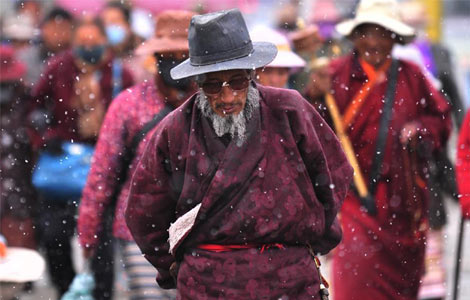The road once taken
Updated: 2013-10-29 08:12
By Cui Jia (China Daily)
|
||||||||
Dancing and singing
A little later, the Xibe from Xinjiang began to dance around the flames, singing about the canals the ethnic group built in Qapqal. Meng was invited to join in, but politely refused because he didn't know the dances or refrains. "I so wish I could be as Xibe as them," he whispered.
The following morning, as Xue walked along the riverbank to pick up a pebble for her father, she was stopped by Heymdrog. "You cannot take anything away from the grassland," he said politely, but firmly. After explaining why she wanted the pebble, he relented and allowed her to take just one.
Another important stop for the Xibe on the westward journey was Uliastay, where the original travelers stayed for six months to sit out the harsh winter and welcome the birth of more than 350 babies, some of whom later died on the road. About one in 10 of the Xibe in Qapqal are descended from those babies.
The group arrived at Uliastay, deep in the heart of the mountains, in the middle of the night after 17 hours of driving across the grassland and the Gobi desert. Despite their fatigue, many were unable to sleep in the traditional Mongolian yurts because they were excited about paying their respects to their ancestors the next morning.
Shortly after sunrise, Zhang began to line up the food for the ceremony, which took place in the river valley where the locals claimed the original travelers had stayed. One of the important offerings was garlic, which is indispensable to Xibe people, no matter where they are from.
The group lined up along the riverbank. One by one they knelt and bowed to the west and the east. "Your children have finally come to see you. We apologize for keeping you waiting this long," said a tearful Guan, pouring alcohol onto the riverbank.
Uliastay was once the base of a Qing Dynasty general, Chenggun Zhabu. A stone carved with the Chinese characters Qinglong Qiao (Black Dragon Bridge) can still be seen in the city center, but the general's manor has turned to rubble.
The group trekked down to the ruins of the manor on foot. Their ancestors had also come here, to ask the general to replace their sick and dying animals so they could complete their mission faster. Small pieces of half-buried china, bearing colored patterns, reflected the sunlight. The sight immediately reconnected the Xibe with the Qing Dynasty, famous for its expertise with ceramics.
After 13 days of traveling across Northwest China and Mongolia, the eight Xibe people finally arrived at Qapqal. The same journey took their ancestors 16 months to complete; many of the women took the babies born in Uliastay to report to General Mingrui, because their fathers had died on the road. The babies became known as "the youngest soldiers in the world".
The Xibe built watchtowers known as kalun along the border, and the ruins of Nadanmu Kalun, made of mud, are just 10 km away from the current Chinese-Kazakhstan border. Only seven kalun remain in Qapqal.
 ABC apologizes for 'Kimmel' joke
ABC apologizes for 'Kimmel' joke
 Snowfall hits many areas of Tibet
Snowfall hits many areas of Tibet  Lang Lang named UN Messenger of Peace
Lang Lang named UN Messenger of Peace Antiquated ideas source of Abe strategy
Antiquated ideas source of Abe strategy
 Storm wrecks havoc in S Britain, leaving 4 dead
Storm wrecks havoc in S Britain, leaving 4 dead
 Women's congress aims to close income gap, lift status
Women's congress aims to close income gap, lift status
 Sao Paulo Fashion Week held in Brazil
Sao Paulo Fashion Week held in Brazil
 Serena beats Li Na for WTA title
Serena beats Li Na for WTA title
Most Viewed
Editor's Picks

|

|

|

|

|

|
Today's Top News
Albright counsels fact not myth in US-China relations
Is Obama's lack of transparency really his fault?
San Diego Symphony debuts at Carnegie
Lang Lang takes on UN `Messenger of Peace’ role
At 72, China’s ‘Liberace’ still wows fans
Penn State: 26 people get $59.7m over Sandusky
China providing space training
Miscommunication causes conflicts
US Weekly

|

|







